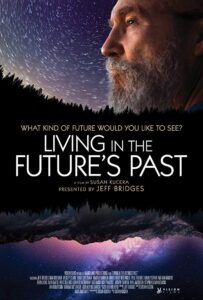Charting the rise of the super-organism, Jeff Bridges makes an impassioned plea for all of us to do a little something for the planet.

 As stark warnings about climate change hit the news claiming that we have only 12 years to limit the coming catastrophe related to extreme weather changes, director Susan Kucera teams up with a number of academics and actor Jeff Bridges on the aptly titled documentary “Living in the Future’s Past.” The film is absolutely gorgeous, featuring an amazing collection of high resolution footage working in tandem with Bridges’ rich narration. Without being preachy, this didactic narrative is informative and serves as a low key prayer for universal support for conservation.
As stark warnings about climate change hit the news claiming that we have only 12 years to limit the coming catastrophe related to extreme weather changes, director Susan Kucera teams up with a number of academics and actor Jeff Bridges on the aptly titled documentary “Living in the Future’s Past.” The film is absolutely gorgeous, featuring an amazing collection of high resolution footage working in tandem with Bridges’ rich narration. Without being preachy, this didactic narrative is informative and serves as a low key prayer for universal support for conservation.
Calling the human race a “super-organism,” Kucera contrasts and compares our species’ evolution to the progress of other organisms. And by concentrating on energy, how its many forms have led to changes in our environment, the film makes a good argument for altering our focus. It is human mastery of technology that may hold the key to our salvation, as its advances may have also created the problems we now face.

To make an effort to separate the film’s perspective, which clearly errs on the side believing that human activities have caused climate change, Kucera finds an advocate for the push for deep mindfulness in former Republican Congressman Bob Inglis, from South Carolina. Inglis is an articulate, smart guy, who last lost his seat to Trey Gowdy in 2010. While he’s not a scientist, he is a good mouthpiece for the argument that the overwhelming majority of scientists believe that human activities have contributed to the growing climate problem.

Another non-scientist voice is that of General Wesley Clark, the former NATO Supreme Allied Commander. A Democrat, who once sought the presidential nomination, Clark too shares Inglis’ views on climate change. And when these layman voices, like that of journalist Paul Roberts, are combined with experts in various fields, the film has a nice balance, if also one that gives no time to the small, but vocal, group of global warming deniers. This is a suggestive piece of filmmaking, not one that directly attacks those with differing views.

And it is the interesting number of thinkers scattered upon a rich tapestry of images that make “Living in the Future’s Past” such an entertaining and informative feature film. The approach isn’t heavy-handed, and those that are on the fence about the subject might benefit. I especially appreciated the attempt to reasonably appeal to our responsibility as the guardians of our planet. Inglis even manages to work in a bit of religion, by appealing to Evangelicals, who might otherwise ignore changes as part of God’s will.

What’s telling is that with the dire warnings of the last few days, charting a point of no return unless actions are taken within the next decade, the requests made in “Living in the Future’s Past” are so incremental. Kucera cleverly proposes a path to reversal of energy addictive habits. There is the suggestion that one car starting every morning by itself might not seem like a great contribution to the problem, but millions and millions of cars starting would understandably have an impact.
So, following that logic, if we choose to limit our use of the car, or something else, and opt for moderation in consumption of resources, we can, in a sense, do our part. I’m reminded of the great number of scooters that currently line the sidewalks of Atlanta, or the interest in reading food labels to discover where the ingredients may have originated. Doing your part might not be as hard as you think, and who knows, it might be a lot of fun too.

Bridges’ final statement is an eloquent and utterly cool call to action. His well-written and persuasively delivered words point up vividly that the guy, who has over his lengthy career inhabited so many iconic screen characters, like the stoner dude from “The Big Lebowski,” might be one of the most effective spokespersons for such a laid back but subtly important message. It might not take drastic and extreme measures to change the course of the future, and since we are living its past, we have a chance to shape what comes next.
